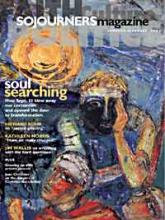SINCE THE TRAGEDY of Sept. 11, I have found myself becoming increasingly uneasy with the tenor of public discourse relating to Judaism and Israel, andless obviously but more particularlythe anti-Semitic speech roaring through the commercial media. Sojourners is to be numbered among those in the media espousing a subtle but very obvious anti-Semitism, clothed in the more palatable attire of disaffection with the policies and practices of the current government of Israel. I am hopeful that the editors, staff, and readers of Sojourners will engage in some sincere soul searching regarding their attitude toward Israel and Judaism.
In that vein, I must take issue with a review by Danny Duncan Collum of the book Elie Wiesel and the Politics of Moral Leadership by Mark Chmiel ("Culture Watch" November-December 2001). I teach in the religious studies department of a local university, and I have had the good fortune and pleasure to meet Wiesel at several conferences and lectures. I consider him to be an authentic voice of moral conscience, and his is a story that should chasten and inspire us all. Imagine my amazement that your reviewer should posit a book that will ask whether Wiesel "measures up as a moral prophet against mass suffering and mass murder in the 20th century." Collum finds satisfaction in the authors complaint that Wiesel has not advocated enough for all victims of the world. What absolute nonsense. Since when does Elie Wieselor any Holocaust survivorhave to answer to anyone for anything? He has not advocated enough? Just the fact that Elie Wiesel continues to speak, lecture, write, and reflect is gift enough for our wearied and facile moral understanding.
Read the Full Article
